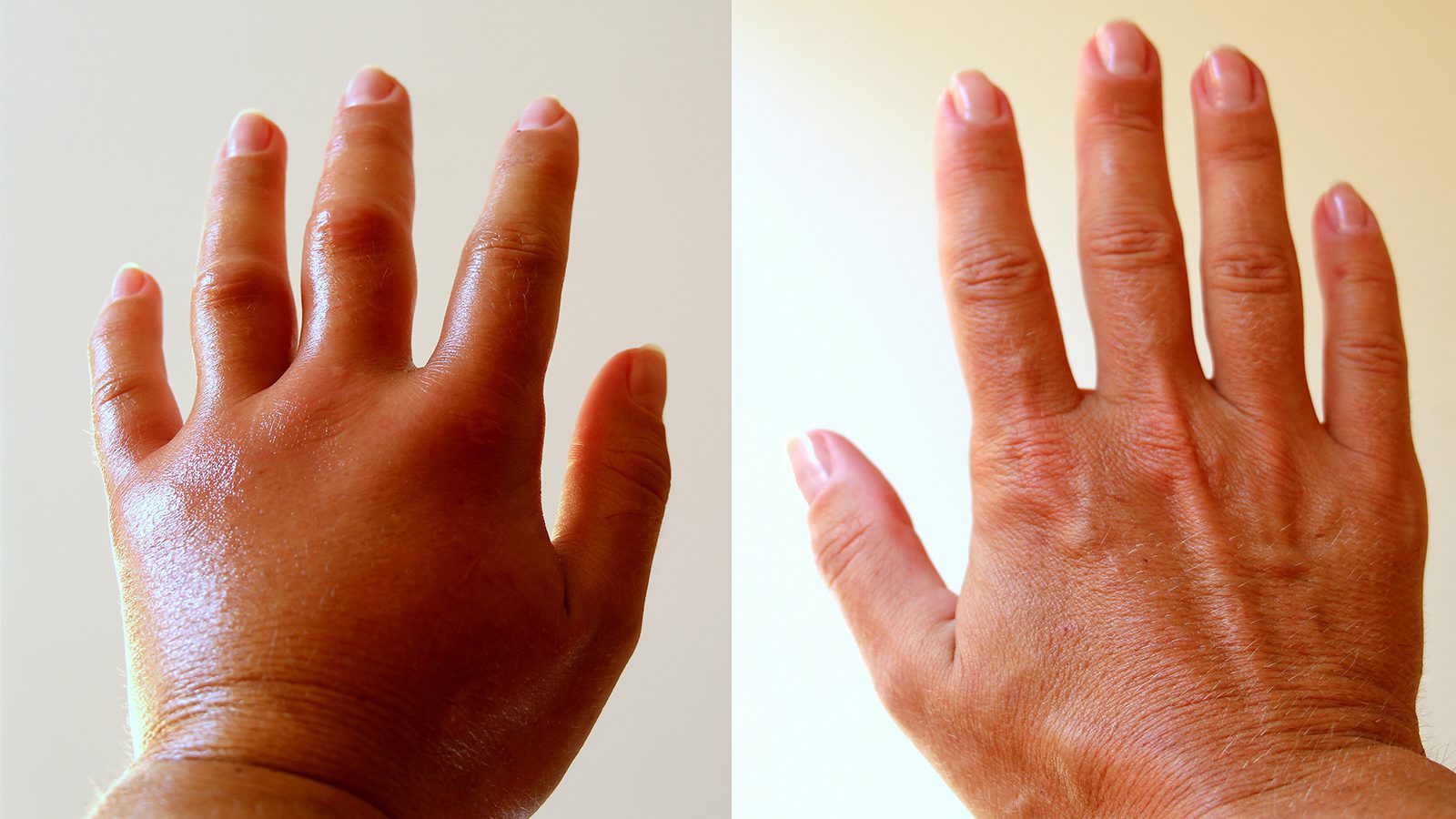Swollen hands occur when water and other bodily fluids accumulate in tissues and cause inflammation. Usually, hand swelling happens due to several factors, including injury, pregnancy, or certain diseases such as arthritis. Your hands can provide essential health indicators such as blood pressure and fluid balance.
For instance, eating excess salt can cause hypertension, leading to swollen, puffy hands and feet. Other causes of may include kidney disease, chemotherapy, exercising or working outside in hot weather, and certain vascular diseases.
However, most of the time, hand swelling shouldn’t alarm you since it usually subsides quickly. Plus, you can treat hand inflammation with home remedies such as taking a warm shower, applying ice packs or heating pads, or doing simple stretches.
But if the symptoms persist, you should visit a doctor for an accurate diagnosis and treatment plan. Medical professionals can often glean insight into your overall health from symptoms like swollen hands, underscoring the importance of recognizing and addressing this issue.
Understanding the Causes of Swollen Hands
Understanding the causes of swollen hands is essential to treat symptoms and helps you know when to schedule a doctor’s appointment. You should consult a health professional immediately if you have a hand injury or underlying medical conditions like high blood pressure or kidney disease. These conditions could seriously impact your health and even become life-threatening if left untreated.
For example, disease symptoms like hand swelling may seem harmless initially, but they may indicate a thyroid condition requiring medication. People with untreated thyroid problems may develop heart disease, infertility, thyroid cancer, and other serious issues.
In most cases, however, hand swelling usually indicates a fluid imbalance in the body due to excess salt consumption. Lifestyle factors like consuming too much processed, salty foods and a sedentary lifestyle can significantly contribute to swollen hands.
What Swollen Hands Can Reveal About Your Health
Physical signs: potential links to conditions such as arthritis, kidney disease, or heart disease
As mentioned, swollen hands can signal underlying conditions such as arthritis, heart problems, kidney disease, and thyroid disorders. According to the National Kidney Foundation, swelling in the extremities is one of the telltale warning signs of both kidney and heart failure. Usually, the kidneys filter waste from the blood and eliminate excess water through the urine. When they malfunction, it leads to fluid retention and the dangerous accumulation of waste products.
Arthritis can also cause swollen hands due to inflammation and joint pain. Finally, thyroid conditions like hypothyroidism may lead to hand swelling because of hormone imbalances caused by a slower metabolism. Certain cancers like liver, breast, and kidney cancers may cause edema (swelling) in addition to chemotherapy medications.
Mental stress signs: How swelling could potentially indicate stress and anxiety disorders
If you experience acute or chronic anxiety, you may notice uncomfortable symptoms such as swollen hands. When you feel stressed, your body produces excess adrenaline and cortisol, redirecting blood flow to the vital organs. Less blood flowing in your extremities can lead to problems like swelling of the hands and fingers, tingling sensations, and weakness. Excess cortisol can also contribute to fluid retention because it increases inflammation. Therefore, having high stress levels and imbalanced hormones can easily cause swelling in the extremities.
Doctors Explain What Swollen Hands Reveal About Your Health
You should discuss your symptoms and concerns with a doctor if you experience frequent stress-related symptoms or physical health issues. It’s imperative to seek medical advice if you’ve had swollen hands for prolonged periods, as this could indicate an underlying condition. However, you probably have nothing to worry about if the problem disappears after several days. Still, it’s better to be safe than sorry about your health, and a doctor’s appointment could help ease your mind.

Effective Management and Treatment of Swollen Hands
- Dietary changes: Incorporate a diet consisting of nutritious and fresh foods. This can help reduce inflammation and promote overall health, potentially alleviating hand swelling.
- Hand exercises: Engaging in specific exercises that target the muscles and joints of the hands can help improve circulation and reduce swelling. These exercises may include finger stretches, wrist rotations, and squeezing stress balls.
- Regular physical activity: Maintaining an active lifestyle promotes blood flow and reduces fluid retention, which can worsen things. Engage in walking, swimming, or cycling to improve overall circulation and minimize swelling.
- Increased water intake: Staying hydrated is crucial for maintaining optimal fluid balance. Drinking adequate water can help reduce water retention and minimize hand swelling.
- Stress management techniques: Chronic stress can contribute to inflammation in the body. To reduce stress, practice relaxation techniques such as deep breathing, meditation, or yoga.
- Sufficient sleep: Getting enough restorative sleep is essential for overall health and well-being. Lack of sleep can increase inflammation in the body. As a result, it may worsen the problem. Aim for seven to nine hours of quality sleep each night.
- Stretching arms above the head: Simple stretches where you raise your arms above your head can aid in improving circulation and reducing hand swelling. Perform this stretch several times a day to experience potential benefits.
- Ice packs: Applying ice packs to the hands can help constrict blood vessels, reduce inflammation, and alleviate swelling. Wrap the ice pack in a cloth or towel before applying it to prevent direct contact with the skin.
It is important to note that if the trouble persists or is accompanied by severe pain, redness, or other concerning symptoms, it is crucial to seek medical attention. For more serious causes of hand swelling, such as kidney or heart disease, specialized care from healthcare professionals may be necessary for an accurate diagnosis and effective treatment. Always follow the guidance of your doctor and adhere to any treatment plans to address underlying conditions contributing to hand swelling.
The Importance of Recognizing Symptoms for Overall Health
Recognizing and understanding symptoms like swollen hands contributes to proactive healthcare because it addresses problems head-on. The best time to get treatment for a potentially serious health problem is when it first arises. That way, your symptoms will be more manageable, and the disease or injury won’t have time to spread. Positive health management can help reduce it since your doctor will give you a comprehensive treatment plan. Or, if you experience mild symptoms from working in the heat or being pregnant, at-home remedies can nip your swelling in the bud.

Final Thoughts on What Swollen Hands Reveal About Your Health
If you see these signs, you must recognize your symptoms before they become serious. By understanding the signs of trouble, you can take preventative measures such as drinking more water or exercising to reduce inflammation. Making a few positive lifestyle changes can improve your physical and mental health, including symptoms of swelling. Usually, many people find that exercising regularly, eating a balanced diet, and reducing salt can drastically reduce inflammation and edema.
However, if the symptoms have persisted for months or years, a health consultation is ordinarily necessary to diagnose the problem. Doctors can pinpoint the exact cause of the swelling and prescribe certain medications and other therapies to manage symptoms. Remember to take your health seriously and put yourself first because you deserve to feel your best.



















